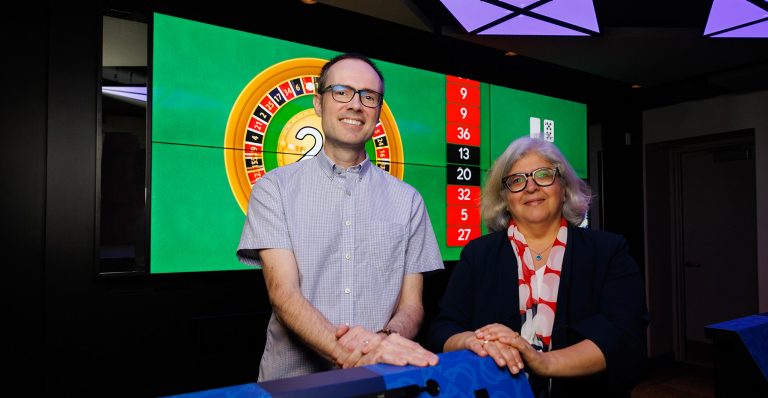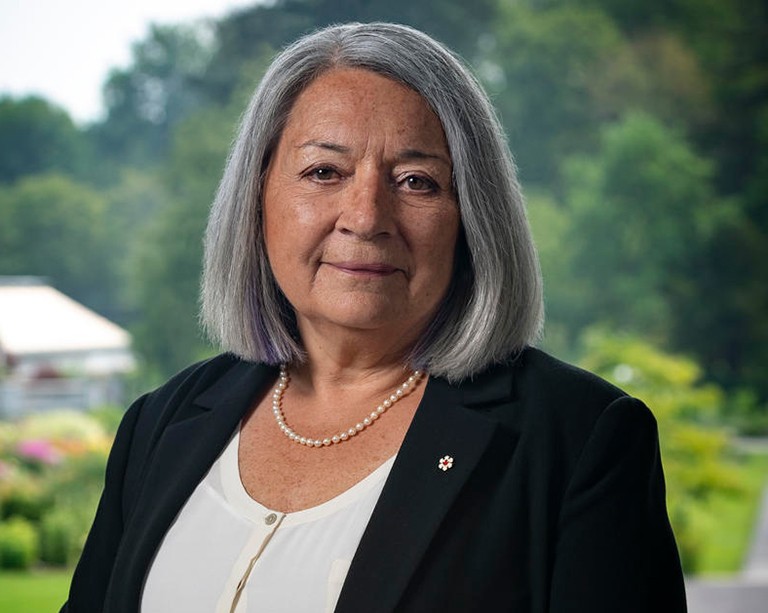The CHANCE collaboratory allows researchers to study digital gambling behaviour in real time

A new research facility at Concordia University will examine the gambling industry’s embrace of the digital revolution.
Housed on the university’s Sir George Williams Campus, the Collaboratoire pour les études des jeux de hasard et d’argent numériques connectés (CHANCE) is a space for researchers to examine the social aspects of gambling behaviour — in particular, the ways in which gamblers interact with their environment and with each other.
“We wanted to simulate a natural setting where we can have the gambler, the game and the social environment in one same spot, where we can film them, listen to what is happening and observe how people behave together in a gambling environment,” says co-director Sylvia Kairouz, a professor in the Department of Sociology and Anthropology and the Concordia Research Chair on Gambling.
As a collaboratory, the space is designed to serve both as a laboratory where experiments can be conducted and as a collaborative area where different partners can gather to exchange information, ideas and knowledge.
“We want people to live the experience of what we see as being risky or harmful in order to raise public awareness,” she adds.
The space will be open to the public and to stakeholders like policymakers and government representatives. There they will be able to both feel and see how digital gambling subtly but effectively influences gamblers’ behaviours.
“It’s very hands-on, and we want to have experiences that can really trigger thinking around how we can make the gambling environment safer.”
 A participant at the CHANCE Collaboratory with Martin French (right)
A participant at the CHANCE Collaboratory with Martin French (right)
An immersive experience
The CHANCE collaboratory’s co-director is Martin French, an associate professor in the Department of Sociology and Anthropology. He says he envisions it becoming a “crucible for trying to make sense of the intensifying phenomenon of online gambling. Working from a public health and harm prevention perspective, we are trying to think about how risks are amplified, how people might be put in a position where they increase their risk of experiencing gambling-related harm.”
The researchers designed a room that simulates the inviting, welcoming space found at La Zone at the Casino de Montréal, an innovative multigame area containing dozens of interactive gaming terminals set in a nightclub atmosphere. The CHANCE collaboratory contains a handful of terminals, a wall-size screen and several discrete cameras. It also has the back-end ability to capture and visualize what is happening in-game allowing researchers to monitor participants’ behaviour for study both in real-time and later.
“We constructed this space to take people into the social experience of gambling,” he says. “The recording equipment gives us the ability to look both behind the curtains of the game, so to speak, and at the social context that envelopes gameplay.”
The facility also has conference rooms where researchers and their subjects can discuss their experiences as well as the technological and social architecture designed to shape and influence their behaviour.
 Martin French monitors players' behaviour at the CHANCE Collaboratory
Martin French monitors players' behaviour at the CHANCE Collaboratory
“Digital consumption is deeply embedded in people’s everyday lives, whether it’s playing a game on your mobile device, watching a movie on a streaming service or ordering your dinner from a delivery platform,” French says. “The CHANCE collaboratory can help people talk, and think critically about, the ways that our digital lives may be architected to influence our consumption patterns, to addict us and keep us in the consuming zone.”
The researchers note that, while Loto-Québec did allow them access to La Zone when they were setting up the collaboratory, the gambling operator was not involved in the creation of CHANCE.
Indeed, in the field of gambling studies — as in other research fields where powerful industry actors have shaped the production of knowledge (think of how the tobacco industry worked to dispute the research showing the harmful nature of their products) — it is vital to maintain independence from industry influence. Accordingly, the CHANCE collaboratory was created through research grants, involving support from the Canada Foundation for Innovation, the Government of Quebec and Concordia.
Visit the CHANCE Collaboratory’s website.


